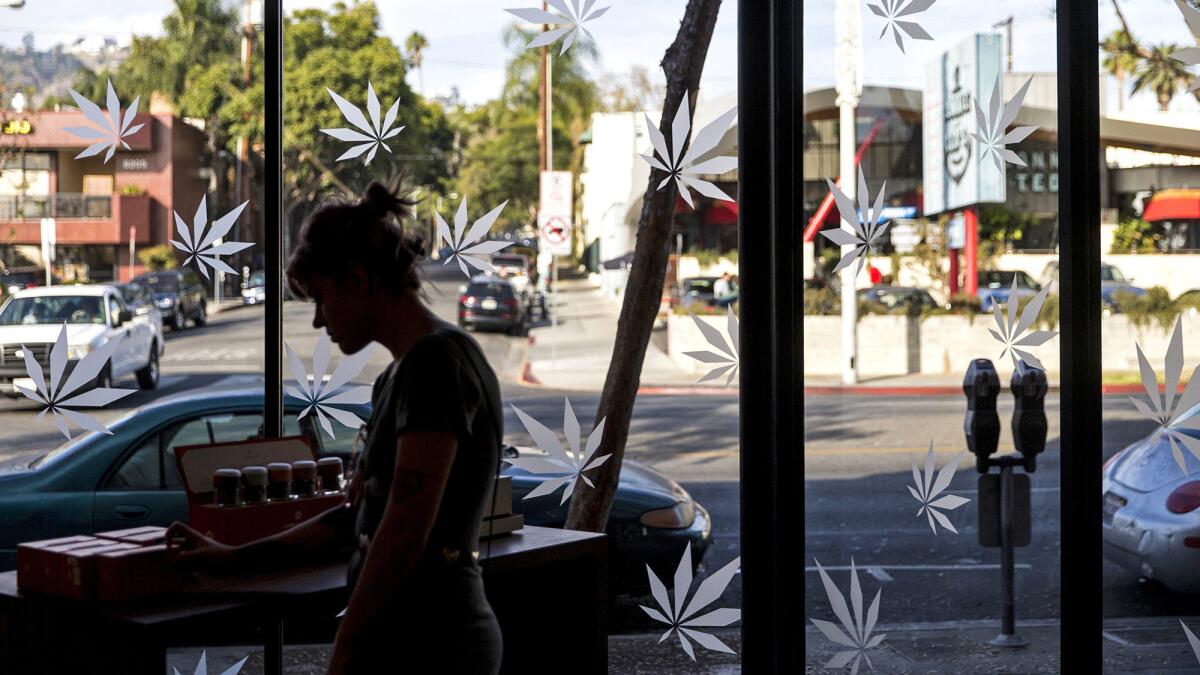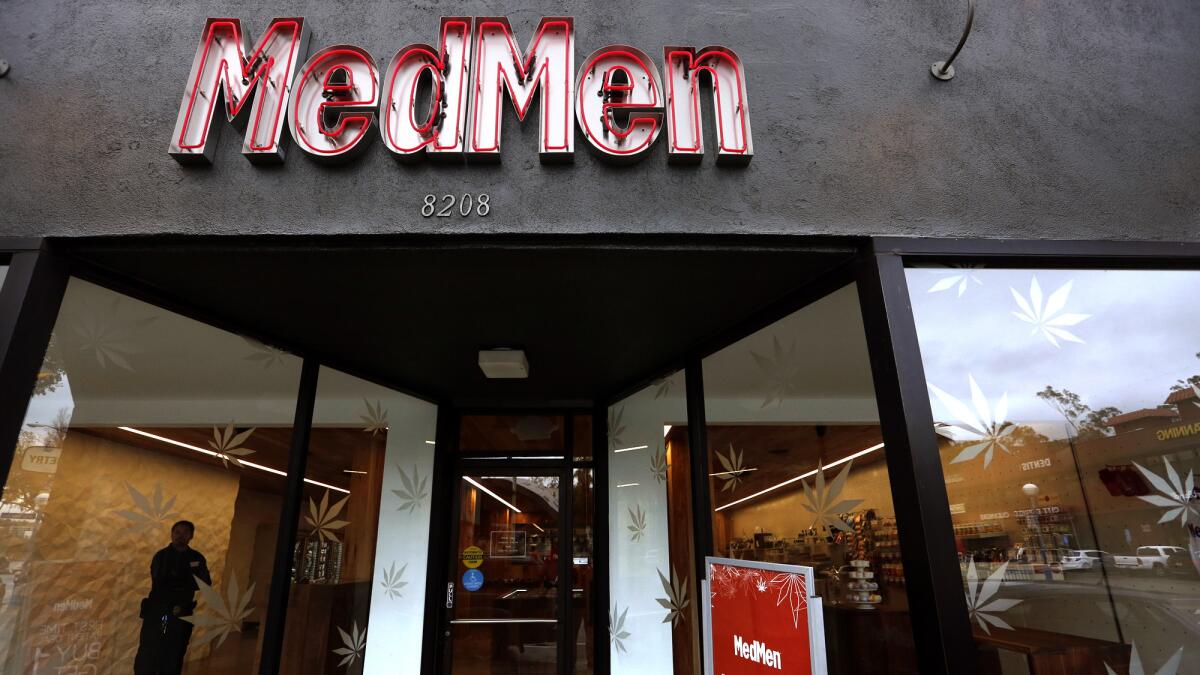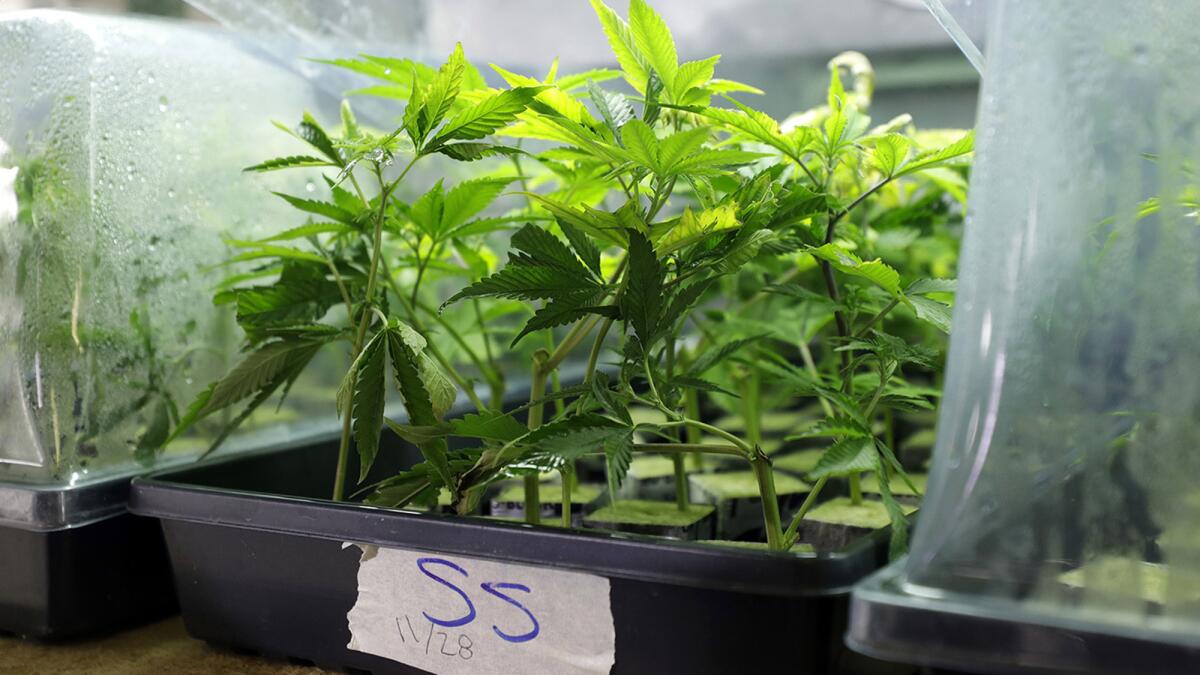Legal weed can raise the roof on home prices

- Share via
The societal ramifications of state-legalized marijuana — a $10.4-billion industry — are being hashed out, study by study. And home values are one of the effects under scrutiny.
The link between real estate prices and weed might not be readily apparent, until one considers the en vogue vibe of licensed retail pot shops. Some are so slickly upscale-minimalist they sell branded yoga mats and Obama Kush, a Cannabis indica strain that “channels the president’s famous message of ‘change’ as it invigorates and inspires.”
Your favored budtender can set you up, and she might even offer hope: Lucrative legal weed does indeed seem to bake premium bucks into the worth of your home.
The most thorough study found that legalizing retail marijuana in Colorado increased housing values by about 6%, or $15,600 a property. Among all the factors contributing to home price increases, that accounted for about 27% of overall appreciation in municipalities that adopted legal cannabis from 2010 to 2015, according to the University of Mississippi study, published last year in Economic Inquiry.
“Our result is quite robust,” the study’s coauthor, Cheng Cheng, said in a written response to questions. “This result remains robust when we account for the impact of other common housing value determinants (e.g., housing characteristics and demographics) and of the regulation of medical marijuana.”

And the effect was still evident when they compared different municipalities within metropolitan areas, said Cheng, an assistant professor of economics at the University of Mississippi. He used a variety of data sources — including tax assessors, county records, the U.S. Census Bureau and the MLS — to arrive at his conclusions.
Colorado approved marijuana for recreational use in 2012. In 1996, California became the first state to legalize medical cannabis, and voters approved recreational use in 2016. Cannabis remains illegal at the federal level, classified as a Schedule 1 drug, along with others considered ripe for abuse, such as heroin and LSD.
Cheng posits that property values get a contact high from retail marijuana because home buyers, entrepreneurs and job seekers who flood a newly legal marketplace create “unprecedented business and employment opportunities.” They’re also sparking demand within a fixed housing inventory. And he added that an injection of new tax revenue means neighborhood amenities can be upgraded, likely enticing homeowners to stay put while driving prices upward.

Other sleuths have sliced and diced Zillow’s vast real estate data to arrive at similar findings — a process that’s now relatively easy given advances in text-mining software.
Home values immediately increased once voters approved legal cannabis, long before retail shops opened, according to a Zillow analysis run by St. Louis-based Clever Real Estate, an agent referral network. The firm examined data from 2017 to 2019 in all U.S. cities.
Those that legalized recreational marijuana saw home values increase $6,337 more than in cities where pot is illegal, the study found, after controlling for population, initial home values, GDP and other variables.
“There’s an immediate bump right after legalization because investors see opportunities to go into those markets; they bring more job seekers,” said Thomas O’Shaughnessy, Clever’s head of research. A 2018 Cato Institute study observed findings similar to those unearthed by Cheng and Clever.
Cities that approved marijuana only for medical use did not experience the same value jolt as those where recreational weed is available. Instead, home prices increased at rates comparable to those in cities where all marijuana is illegal.

So it appears the commercial sale of cannabis is what stimulates home values. Washington, D.C., legalized cannabis for recreational and medical use in 2014 but barred commercial sales. Lack of a regulated citywide pot market “resulted in slower growth for the D.C. area compared to the national average,” author Luke Babich wrote in the Clever study.
Without that cash flow (sales of buds, edibles, extracts, tinctures, vape pens, branded yoga mats…), “money won’t flow back into the market and housing prices won’t respond over the long term,” Babich wrote.
Following California’s voter approval of cannabis in November 2016, “San Jose saw its sharpest historical two-year increase in home values” in two decades, a $303,200 hike, Babich noted. Of course, that entire $300K can’t be attributed to legal weed, said O’Shaughnessy, especially given Silicon Valley’s blistering housing market.
Still, (borrowing from that “Obama Kush sales copy) such increases no doubt induce a “euphoric rush” as well as some “cerebral stimulation” — at least for homeowners. For home buyers, news of pot-induced price hikes are probably a serious buzzkill.
More to Read
Sign up for Essential California
The most important California stories and recommendations in your inbox every morning.
You may occasionally receive promotional content from the Los Angeles Times.






